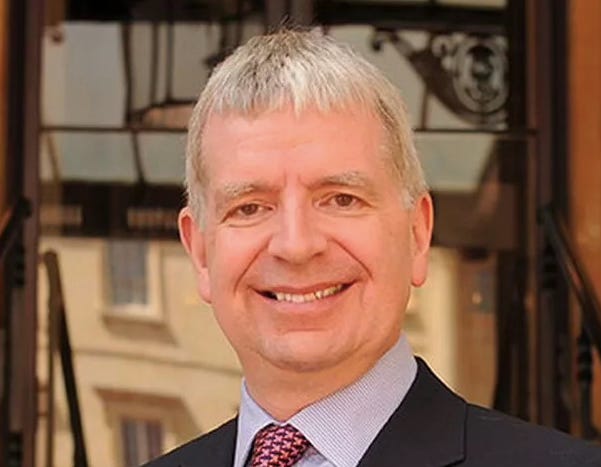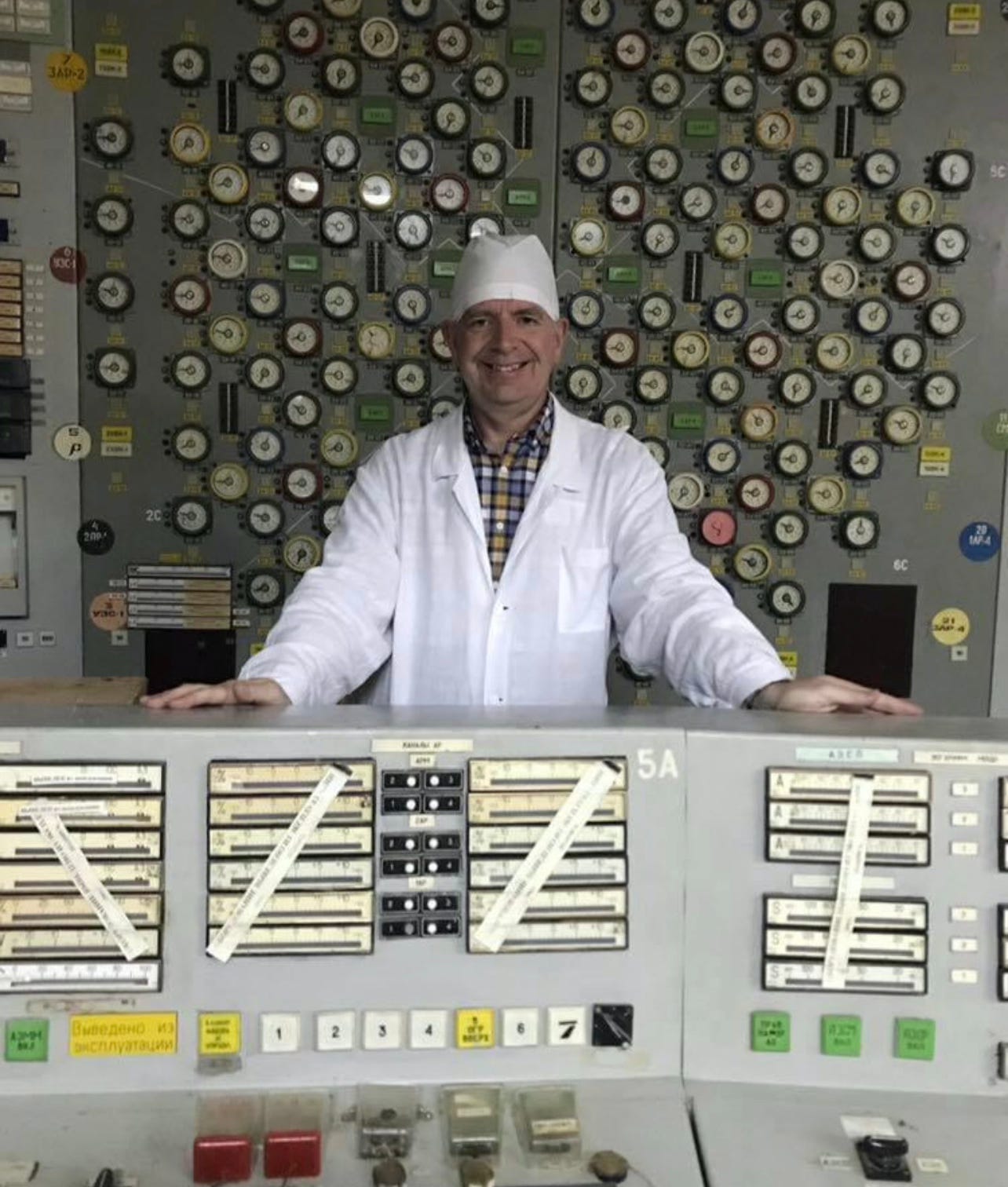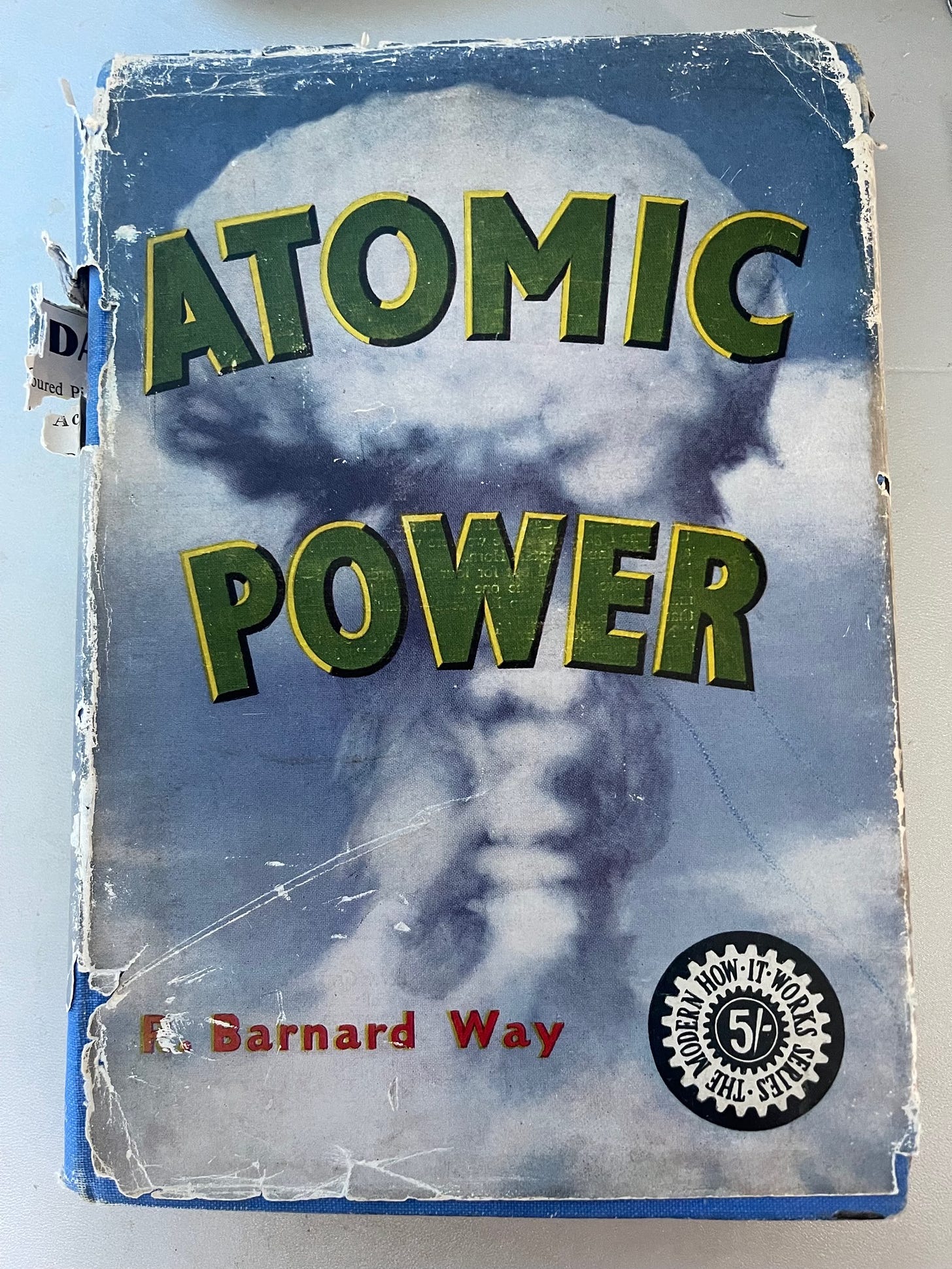The Atom & Us: Adrian Bull
"It’s a word which as soon as you utter it makes many people react"
Thanks for reading ‘The Atom & Us’, a series of interviews in which I’m spotlighting the work and insights of some of the incredibly interesting individuals I've been privileged to get to know through making & distributing my own nuclear history film, 'The Atom: A Love Affair' - from scholars and artists, to industry professionals, campaigners and more.
Together, I hope the ideas & experiences of our atomic age they share here will help us all deepen our understanding of one of the most vital & urgent - yet in my view, also one of the least well-discussed & understood - topics of the 21st century world.
Welcome, welcome, pull up a chair. In the midst of all the hustle and bustle of the impending end of the year, it's my pleasure to be back with this, the second instalment of my new interview series.
Just a brief reminder of how it works – in every interview, I'll be posing the same set of questions, as a jumping off point for each contributor to talk about their work and experiences of 'the atom' in whatever way they relate to it.
I’ll then respond briefly and then I’d love to invite you to get involved in the comments to get a broader discussion going (as you'll see, this week's interview directly touches on the whole topic of discussion and debate, so hopefully that will be encouragement for us to follow suit here!)
And if you usually read my posts via email, remember it's really easy just to hop on over to the Substack webpage or app to comment – here's the link for the app if you want to check it out.
And so, let me introduce you to this week's esteemed interviewee:
Adrian Bull
I'm sure Adrian won't mind my saying that he's something of a 'big cheese' in the British nuclear power world. He's spent his entire career in nuclear, most of it directly in the industry itself and the past few years in academia. And he's currently the President-Elect of the UK's professional membership body, the Nuclear Institute. He knows this world inside and out.
Thankfully for my nerves, I didn't yet know all this when I first saw him striding over to me in the foyer of the Rosehill Theatre in Whitehaven, Cumbria. I'd just screened 'The Atom: A Love Affair' to an audience substantially composed of nuclear employees from Sellafield, the biggest (and certainly in some circles, most notorious!) nuclear site in the UK.
As I clutched my plastic cup of wine, I had some serious imposter syndrome going on. What would they make of me, an English graduate with no previous connection to their world, coming along and telling their story, warts and all (whilst my film doesn't advance any particular agenda for or against nuclear, it also doesn't pull its punches in discussing the various difficulties and problems it has faced across its history)?
Luckily, these fears were quickly allayed by Adrian, who approached me with a big smile, told me he'd loved the film and said with a twinkle in his eye:
“I can't tell you who it is - but I know exactly who wrote that memo about the 'anti-nuclear chaps and chapesses'!”
A reference to this moment in the film:
We proceeded to have a great conversation, one of many we've had the past couple of years, in which I’ve found him to be refreshingly open to an exchange of ideas.
We don't necessarily agree on everything – I think it's fair to say I'm far less sure than he is that nuclear power can or will play a vastly increased role in our energy future, for a number of different reasons.1
But he’s without exception always friendly, warm and curious. And he listens to and takes on board the thoughts and objections of those who are skeptical about nuclear, rather than just dismissing them out of hand as ignorant or emotional - which I know from making my film, the industry has had an unhelpful tendency towards doing at times in the past.
His is definitely the kind of public engagement I think the industry needs. I've really enjoyed getting to know him – and I hope through this short interview you will too. And so over to Adrian...
Who are you and what's your connection to 'the atom'?
I’m Adrian Bull. Now a part time academic in the Dalton Nuclear Institute at The University of Manchester. Before that I worked for almost 40 years in the nuclear industry, for British Nuclear Fuels Ltd (BNFL), Westinghouse and the UK’s National Nuclear Laboratory, where I was External Relations Director for 10 years.
Tell me about your early memories, thoughts & feelings about nuclear - can you remember when & how you first encountered anything atomic (something you read or saw on the news, or at school maybe, or encountered some other way?)
My father worked in the nuclear industry as an instrumentation engineer and draughtsman from before I was born. So while I was a young child “nuclear” was just where Dad worked. He had a stroke when I was 11 and never went back to work afterwards, but he had a few friends who continued to visit him from BNFL, where he worked. They suggested I try to get a sponsorship from the industry when it looked like I might be going to university to study something scientific/ engineering based.
When did you first become actively engaged in working in/thinking about nuclear and what did that look like for you?
In terms of thinking about nuclear, it would be this film which was a “Trade Test Transmission” shown randomly on BBC during the daytime when I was a small boy of about 5 or 6. My Dad always insisted we watch it whenever he found it was on, as he’d been involved in designing one of the panels.
I’d not seen it for decades until a few years ago when I found it on YouTube (I actually cried when I saw it again). Dad’s panel is in the top right of the screen at 17:13.
I was sponsored to read Engineering at University and when I was in my third year that meant I got the chance of a job interview with BNFL while others were spending their weekends going to “milk round” careers fairs. I figured it was sensible to take the job I was offered and concentrate on my finals, thinking I could always go elsewhere after 6 months if I didn’t enjoy it.
41 years later I’m still up to my neck in nuclear!?
Is there an event or experience from your personal involvement with nuclear that particularly stands out in your memory and why?
Hundreds! I was working in the nuclear industry when both Chernobyl and Fukushima happened so they are both memorable moments when everything became very uncertain. I remember driving home from a meeting as the Fukushima situation was getting worse on a Friday afternoon and wondering if I still would have a job afterwards. My role at the time was promoting nuclear reactors and nuclear power in the UK and Europe, so it certainly got harder!
But I’ve also had some great conversations of all sorts about nuclear and its role. One that I often quote was an older lady in Scotland at a meeting with local councillors most of whom were very much against nuclear. We had a long and robust discussion, and afterwards she said to me as I was leaving
“I don’t agree with you – and I’ll never agree with you – but I’ve had a really interesting time talking about it all.”
I may not have won her over, but it showed me that I’d at least made sure she’d heard both sides of the debate and might at least have softened her opposition a bit after hearing answers to a lot of the concerns she and others had raised.
Why do you personally find it a compelling topic?
It can be so polarising – it’s a word which as soon as you utter it makes many people react. It’s interesting to learn what their first impressions are, and (often) how those can be based on misunderstanding or out of date information.
Why do you think it has always been such a polarising issue and do you have any thoughts on if/how the discourse can be expanded to move beyond a simplistic pro- or anti- binary opposition?
There’s a unique cocktail of factors around nuclear and radiation which make a lot of people wary. You can’t see, smell or taste radiation. The technology is stereotypically big and complex (nuclear physicist sits alongside rocket scientist and brain surgeon as the roles only super-clever people can do, in the world of stereotypes). When things go wrong, they can go VERY badly wrong with global, long-lasting consequences. It leaves a legacy of tangible material for future generations to be the custodians of. The general public feel a lack of control over nuclear plants. The security of sites is perceived as secrecy. And of course there are historic connections with nuclear weapons. Add to that the massive scale of nuclear plants, the costs, the long timescales and the interwoven nature of nuclear with geopolitics, and it’s a pretty heady mix!
As for expanding the discourse – I always try to avoid a “should we have nuclear or not?” type of discussion. I much prefer asking people to think about how a big global economy like the UK should meet its energy needs and its climate obligations – so we look at the pros and cons of all options.
What's the most interesting or important thing about nuclear you'd want to tell people that they might not already know?
I think the fact that it’s the only large scale technology we can build a lot more of in the UK which is both carbon-free and reliable, whatever the weather. So many people don’t realise that.
I also often point out to people that the UK’s peak demand for power is in Dec/Jan at around 5-6pm, when homes, schools, offices and factories are all still open, meals are being cooked and lots of lights are on. We may well have lots of wind then – although cold, still winter days are not uncommon. But we’ll have nothing coming out of solar panels, as it’s dark. Storage of electricity is possible – but it’s expensive and not fully efficient. So nuclear is helpful to underpin the things we really need power for.
Do you have a favourite bit of atomic culture (song, film, book, video game – anything else!) you'd like to share?
I have my Dad’s silver tankard marking 25 years of his service to nuclear. But I also collect nuclear memorabilia (and I’ve LOTS). A favourite of mine is this text book about nuclear energy from 1949 which has a mushroom cloud on the front cover. It’s not an anti-nuclear book at all – it’s an objective scientific text book. But that was clearly the symbolism they thought was best at that time, before any reactor had ever been built (and shortly after nuclear weapons had helped to end WW2).
What do you think I should ask other people about their experiences and thoughts around nuclear?
I’m always interested to ask what people’s first impressions are of nuclear, what they see as the positives and what they think are the challenges and arguments against it. And if they don’t support nuclear, how they see a carbon free future society being powered.
A huge thanks to Adrian for his typically thoughtful responses here. One of the things I particularly enjoyed learning about was that personal connection to nuclear, via his father, that he describes.
Of course, it’s not uncommon in many walks of life for children to follow their parents into a similar line of work. But I think the emotional familiarity that comes with having seen something close up from childhood may be especially powerful in an industry that, as Adrian rightly mentions, has often seemed shrouded in mystery, both in terms of the perceived complexity of what it does, but also as a product of the military and political factors surrounding it.
It’s also more common to see ‘ nuclear families’ (excuse the pun) clustered in areas around nuclear reactor sites since they were often built in rural or coastal areas where there haven’t always been a lot of other good jobs on offer. The flip side of that of course being that if you don’t live anywhere near a nuclear plant, it’s not terribly likely you’ll know anyone who works at one.2
This may be yet one more reason for the polarisation around the subject of nuclear power which I encountered again and again when making my film (hence including it in my questions for this series). It’s hard to think of another subject where people are quite so keen for you to occupy a ‘camp’, whether for or against, except perhaps abortion in the US and more recently in Britain, maybe Brexit. Though even that has, I think, morphed towards a greater allowance for nuance in the past few years.
I certainly agree with Adrian that the black and white, ‘should we have it or not’ framing isn’t especially illuminating. I’m personally much more interested in exploring the complex web of factors both in the technology itself and in different groups’ feelings towards it. Which is in fact what I do in my film. It’s good. You should watch it! 😄
I was also fascinated by the whole concept of the Trade Test films. These were very much before my time (the last one aired in 1973 a few years before I was born) and I’d never even heard of them. But apparently some of them were shown hundreds of time during the daytime in those early years of colour television.
And I definitely want to hear more about Adrian’s nuclear memorabilia since I too have LOADS. Maybe we should do a Substack ‘show & tell’ with some of our favourite pieces. Let me know if you like the sound of that as it would be a lot of fun to do!
And that’s where I shall leave it. I’ve got a few special things lined up for you between now and the end of the year so the next instalment in the series will likely be in 2025. But till then, don’t be shy.
Maybe you know someone yourself who’s worked in or around atomic matters (I could include them in this series!) Maybe you remember the Transport Trade Test film Adrian’s dad contributed to - or some of the others. Maybe something else jumped out at you from Adrian’s words. Whatever your thoughts, I’d love to hear them.
Watch my film on Netflix (UK & Europe only) or Vimeo-on-demand - or see trailer, reviews & bonus content HERE
Find me on Bluesky & at LinkedIn
Thank you for being here, please ❤️ (below) or Re-stack if you enjoyed this piece, it really does helps others find it.
There’s no denying that there’s a renewed and concerted effort from many quarters right now to try to underpin a greater role for nuclear in the low-carbon future we urgently need to transition to (see eg this announcement on closer collaboration between the US & UK unveiled at the recent COP conference in Baku, as well as 25 countries pledging to work towards tripling global nuclear power capacity to reach net zero by 2050). I’m just not personally convinced these pledges will translate into reality. Only time will tell I guess.
That said, I’ve been amazed at how many people I’ve met who when I mentioned my film revealed that they do in fact have someone in their family who at one stage or another had some kind of atomic connection.











“ It leaves a legacy of tangible material for future generations to be the custodians of.” How very understated Mr Bull is!